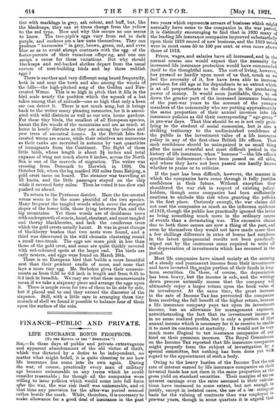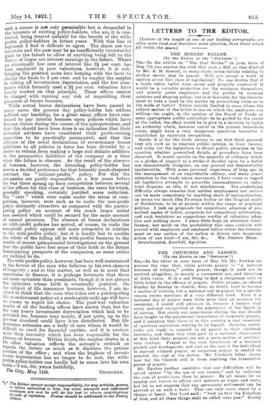FINANCE-PUBLIC AND PRIVATE.
LIFE INSURANCE BONUS PROSPECTS.
[To THE EDITOR or THE " SELOTATOR."3 Sia,—In these days of public and private extravagance and apparent abandonment of the old virtue of thrift, which was dictated by a desire to be independent, no matter what might befall, it is suite cheering to see how life insurance has come into its own again. During the war, of course, practically every man of military age became uninsurable on any terms which he could consider reasonable ; for though all the companies were willing to issue policies which would. come into full force after the war, the war risk itself was uninsurable, and at that time any provision for the after-war period seemed rather beside the mark. While, therefore, it is necessary to make allowance for a good deal of insurance in the past two years which represents arrears of business which might normally have come to the companies in the war period it is distinctly encouraging to find that in 1920 many of the leading life insurance companies improved substantially upon their 1919 record of new business, and the 1919 totals were in most oases 50 -to 100 per cent. or even more above those of 1913.
Prices, wages, and salaries have all increased, and in the normal course one would expect that the necessity for increased life insurance protection would have commended itself to the thoughtful man. The cost of living, however, has pressed so hardly upon most of us that, much as we ncs feel the necessity of it, few have been able to increase provision for old age or for dependents to an extent which is at all proportionate to the decline in the purchasing power of money. It would seem justifiable, then, to set down the greater part of the increased insurance business of the post-war years to the account of the younger members of the community who are putting approximately the same proportion of their annual incomes into life insurance policies as did their corresponding " age-group " in pre-war days. That this should be so is not only grati- fying to the student of social economies, but is also a striking testimony to the undiminished confidence of the public in the investment value of a life insurance policy in any of the first-class British life offices. That such confidence should be unimpaired is no small thing after the most eventful and most difficult period in the history of life insurance, when " bonuses "—the life office's spectacular inducement—have been passed on all sides, and where they have not been passed one hardly knows whether to praise or to criticize.
If the past has been difficult, however, the manner in which the companies have come through it fully justifies confidence in their future. Without exception they shouldered the war risk in respect of existing policy- holders, though some companies had been sufficiently cautious to exclude this risk when granting the policies in the first place. Curiously enough, the war claims did not cost the companies as much as the influenza epidemic of 1919, though the public has practically ignored the latter as being something much more in the ordinary course of events than a devastating war. The excessive claims due to both these causes are now a thing of the past, and even by themselves they would not have made more than a few shillings difference in rates of bonus had surpluses in the latest quinquennial results not been practically wiped out by the enormous sums required to write off the depreciation of investments which has occurred in the period.
Most life companies have aimed mainly at the securing of a steady and permanent income from their investments and have invested the majorportion of their funds in long- term securities. On these, of course, the depreciation has been heavy, but the income is safe, and the writing- down process naturally means that the company will ultimately enjoy a larger return upon the book value of its investment. At the same time, the great increase in the rate of Income Tax has prevented the companies from receiving the full benefit of the higher return, because a life insurance company pays tax upon its investment income, less an allowance for management expenses, notwithstanding the fact that its investment income is in no sense realized profits, but is only a portion of that annual income which is necessary for it to receive to enable it to meet its contracts at maturity. It would not be very much more illogical to tax insurance companies of any kind on their premium incomes. The Royal Commission on the Income Tax reported that life insurance companies might properly form the subject of investigation by a special committee, but nothing has been done yet with regard to the appointment of such a body.
Owing to the heavy burden of the Income Tax the net rate of interest earned by life insurance companies on their invested funds has not risen in the same proportion as the gross yield on standard securities. Their margins of excess interest earnings over the rates assumed in their calcula- tions have increased to some extent, but not enough to justify, except in isolated cases, the use of .a les3 stringent basis for the valuing of contracts than was .employed '11 pre-war years, though in some quarters it is argued that such a course is not only permissible but is demanded in the interests of existing policy-holders, who are, it is con- tended, being treated unfairly for the benefit of the with- profits policy-holders in future years. With this line of argument I find it difficult to agree. The times are too uncertain and the past may be an insufficiently trustworthy guide to the future to allow of anything being left to the chance of larger net interest earnings in the future. Where an abnormally low rate of interest like 2i per cent. has been employed in past valuations, however, it is only bringing the position more into keeping with the facts to change the basis to 3 per cent. and to employ the surplus in writing off investments depreciation, and the few com- panies which formerly used a 2i per cent. valuation have mostly worked on that principle. These offices cannot be charged with running any risk of imperilling their prospects of future bonuses. While actual bonus declarations have been passed in many cases, the present day policy-holder has seldom suffered any hardship, for a great many offices have con- tinued to pay interim bonuses upon policies which have become claims during the course of the quinquennium, and that this should have been done is an indication that their actuarial advisers have considered their profit-earning capacities to be practically unimpaired, and that the absence of the usual declarations of reversionary bonus additions to all policies in force has been dictated by a desire to refrain from making a large and definite addition to the prospective liabilities of the company at a time when the future is obscure. As the result of the absence of bonuses, however, the intending policy-holder has shown a decided preference for that formerly much-despised contract the " without-profits " policy. For this the companies are partly responsible, as a few years before the war there sprang up keen competition between several of the offices for this class of business, the rates for which, generally speaking, certainly justified some reduction. The " cuts which were made under the stress of com- petition, however, were such as to make the non-profit policy distinctly attractive as compared with the partici- pating policy on account of the much larger initial sum assured which could be secured for the same amount of annual premium. The absence of bonus declarations on with-profit policies has served, of course, to make the non-profit policy appear still more attractive in relation to the with-profits policy, but it is hardly fair to ascribe the whole of the falling off in with-profits business to the results of recent quinquennial investigations on the ground that the public have lost some of their faith in the future bonus-paying prospects of the companies, as some critics are inclined to do.
The with-profits policy, however, has been well maintained in the favour of the man who believes in his own chances of longevity ; and in this matter, as well as in most that appertains to finance, it is perhaps fortunate that there are more optimists than pessimists, though it is not always the optimists whose faith is eventually justified. On the subject of life insurance bonuses, however, I am in- clined to think that the man who takes out a participating life or endowment policy at a moderately early age will have no reason to regret his choice. The post-war valuation results of all the leading offices have shown that, but for the very heavy investment depreciation which had to be provided for, bonuses very nearly, if not quite, up to the pre-war standard could have been distributed. But life insurance actuaries are a body of men whom it would be difficult to excel for financial caution, and it is caution more than necessity which has been responsible for the absence of bonuses. Within limits, the surplus shown in a life office valuation reflects the actuary's outlook as regards the future as much as it discloses the precise Position of the office ; and when the bugbear of invest- ments depreciation has no longer to be met, the with- profits policy-holder can hardly fail to come into his own am, Sir, yours faithfully,



































 Previous page
Previous page